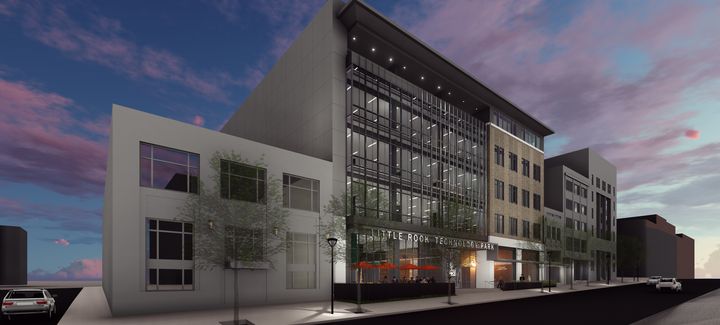Tech Park puts $26 million preliminary budget on Phase II development
by February 14, 2019 1:38 am 409 views

The Little Rock Technology Park Authority on Wednesday (Feb. 13) put a nearly $26 million price tag on the as-of-yet unfinanced second phase of the city’s multi-stage downtown startup village.
In a brief update to the Tech Park’s seven-person board on the progress, the authority’s Executive Director Brent Birch said the preliminary budget tally for the planned five-story, 83,000 square foot STEM-focused building located between the KATV Channel 7 building at Fourth and Main Streets was “pretty accurate.”
That $25.99 million estimate, which was compiled by Little Rock-based WER Architects, includes about $15.4 million of construction costs along with an additional $10 million in direct and indirect costs, insurance and contingencies. Those costs also were “inflation adjusted” based on at least a two-year timetable necessary to complete such a project once financing is in hand or an angel investor is found, said Birch.
“They (WER) have identified a few things between a few dollars one way or the other, but it wasn’t a huge amount at this point,” said the Tech Park’s lone employee. “There are some things that will come to light … once the project gets off the ground and there’s some things that we can or cannot do. But we are not close to making a decision on those things.”
Later, after a discussion by board members on possible ways to finance the project, Birch said he and Tech Park Director Dickson Flake were putting together a “case statement” presentation for the authority to pitch to potential donors or investors to cover the costs for the next iteration of the downtown startup incubator.
“And then we will start and beat the streets and drum up some interest for being part of the project,” said Birch.
In December, WER officials first unveiled architectural renderings for the five-story “shell” building on Main Street. At the time, WER CEO David Sargent said Phase II of the Tech Park’s multi-stage tech village would follow a three-step process. After a final draft of the design schemes were completed, WER then delivered a “schematic package” to Little Rock-based CDI Contractors LLC, the construction manager for the project.
The construction subsidiary of Little Rock-based Dillard’s developed the final budget, which was delivered by Birch at Wednesday’s meeting.
Tech Park board members have said Phase II of the downtown project would serve as the “front door” or official centerpiece for the tech village. The second step of the city’s original bid proposal calls for a STEM-focused office building that would include state-of-the-art wet/dry labs for computing and research, and additional tenant space to office local startups and tech firms.
Last month, Little Rock real estate developer Jimmy Moses prompted an informal board discussion on a possible public-private partnership as he offered potential financing vehicles for Phase II of the downtown development just one month after design plans were unveiled.
In particular, Moses offered as an example his “public-private” experience in developing the downtown Arcade Building, a three-story, mixed use 60,000 square foot office complex in Little Rock’s River Market district that includes retail and office space and the 325-seat CALS Ron Robinson Theater. That $17 million joint venture between the Central Arkansas Library System (CALS) and Moses Tucker Real Estate was completed in 2013.
The Tech Park’s first phase was accelerated in 2011 after Little Rock taxpayers approved a $22.5 million sales tax referendum to finance the project. Then in 2015, a local bank consortium led by Conway-based Centennial Bank financed a $17.1 million loan for the construction of the project.
The first phase of the downtown tech village was completed in October 2017, and the sixth story facility opened for business on Little Rock’s Main Street Creative Corridor in April 2017. Four additional stages of development are planned over several years to foster a Silicon Valley-like entrepreneurial culture in Little Rock’s central city.
